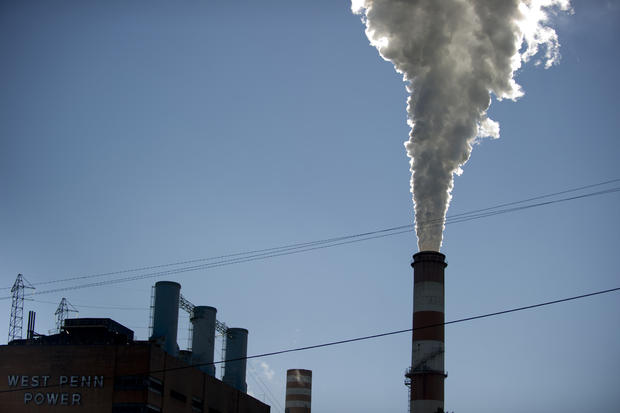Environmental Groups Celebrate Plan To Retire 5 Of Colorado's Largest Coal-Fired Power Plants In 2028
(CBS4) Colorado's Air Quality Control Commission gave preliminary approval Friday to plan to accelerate the retirement of the five of the Colorado's largest coal-burning power plants by the end of 2028. Coal industry representatives, meanwhile, questioned the civilian commission's ability to force early retirement of the units, most of which were already voluntarily slated to cease operations by the utilities who own them.
The commission, a part of the Colorado Department of Public Health and Environment, voted Friday to approve the latest modifications to the state's Regional Haze Plan. The modifications were proposed by the Sierra Club and the National Parks Conservation Association, according to a joint press release from those organizations and Earthjustice.
"The Commission should be applauded for taking this critical step to improve air quality and reduce climate change," said Matthew Gerhart, a Staff Attorney at Sierra Club. "The Commission's decision today will speed up the transition away from highly polluting coal plants toward cleaner energy."
In a fight against the adoption of the revisions, attorneys for Xcel Energy's parent company issued a rebuttal in late October, stating the company "believes it is not legally permissible to use this Regional Haze rulemaking to mandate plant closures earlier than the dates voluntarily committed to by the various utilities."
The attorneys went on to say the retirement decisions are a matter of Public Utility Commission's jurisdiction, and that any Air Quality commission decisions are guidelines that are not enforceable.
"Plant closures are not properly considered control measures under the regional haze program."
There are a total of seven Colorado power plants still burning coal in Colorado, though some contain multiple burning units.
The Colorado legislature passed a bill last year designed to cut air pollution and reduce greenhouse gases.
RELATED: 125-Mile Stretch Of Xcel Transmission Lines Completed, Energized
The president of the Colorado Mining Association, Stan Dempsey Jr., said the commission went against its own staff's recommendations.
"The process has not been completed as to when these units would retire, if at all," Dempsey told CBS4. "It was pretty bold. They usually stick with the staff's recommendation. This could affect every person in Colorado. I don't think western Colorado or advocates for rural communities were aware of this."
Amendments to the Clean Air Act were added in 1990 which precipitated the formation of the state's air quality commission. One of the commission's goals is to ultimately meet the congressionally established National Visibility Goal, a target planned to be met in 2064. The Regional Haze Rule was Colorado's step toward that goal.
The commission, a group of nine civilians appointed by the governor of Colorado, reconsiders and updates its plans approximately every 10 years, Dempsey told CBS4.
The commission could make a final vote on the plan next month.
RELATED: Vestas Announces Layoffs In January 2021
The latest proposal seeks to accelerate the closures of the Rawhide, Nixon, and Craig 3 power plants to no later than Dec. 31, 2028.
The commission deferred on two other coal units at the Hayden power plant, according to the environmentalists' press release, but "signaled" interest in having the same date eventually applied.
The environmentalist groups claimed closing the five units by that date would save taxpayers about $68 million while reducing tons of nitrogen oxide, sulfur dioxide and carbon dioxide released during the production, transportation and burning of coal.
Reducing those airborne pollutants would also improve visibility at Colorado's national parks and reduce citizens' exposure to causes of respiratory illness, the group claims.
The Rawhide plant north of Fort Collins employs a pair of coal power plants and announced earlier this year its plan to retire those units by September of 2028.
"Our board adopted the Resource Diversification Policy in December 2018 calling for a 100% noncarbon energy mix by 2030," PRPA's Steve Roalstad told CBS4, "and we are taking steps to achieve that goal. We haven't had a chance to review the AQCC's deliberations."
The Ray Nixon plant south of Fountain is owned by Colorado Springs Utilities. That board voted in July to move up planned retirement of the plant to 2030. The utility is reportedly shutting down another coal plant, the Martin Drake facility, in 2023.
Tri-State Generation and Transmission, the group that owns the three Craig units, agreed in 2016 to meet Regional Haze requirements then in place by shutting down Craig 1 in 2025.
Monday, Tri-State CEO Duane Highley told CBS4 his company had proposed a plan to the AQCC to shut down Craig 3 by the end of 2029. Its Craig 2 unit was already voluntarily scheduled for retirement in September 2028.
"It must be noted that Tri-State, the other utilities, and the state's professional staff all testified that accelerated plant closures were unnecessary to achieve visibility goals, and exceed requirements to achieve reasonable progress toward achieving visibility improvements under the regulations," Highley said. "The Colorado Air Quality Control Commission's unprecedented preliminary final action to require the early closure of Craig Station rejected the recommendation of the state's professional staff" from the Colorado Department of Public Health and Environment's Air Pollution Control Division and several electric utilities, including Tri-State.
RELATED: Westminster-Based Power Company Closing Three Coal Facilities
Dempsey told CBS4 there is a process that is being ignored. Part of that process, he said, includes the Public Utilities Commission's planning to ensure replacement sources of energy are in place by the time a coal plant is scheduled to cease operations.
"We produce the highest-depth, cleanest coal in the world," Dempsey declared while confirming that Colorado is currently the 11th largest coal producer in the U.S.
But the recent trend toward alternate "green" forms of energy has muddied the future of the mining operations and their workers that support the coal-burning plants. Those plants will eventually be shut down, and the industry knows it's a matter of 'when' and not 'if.'
Coal producers may have one last question to determine their fate, as Dempsey noted: "Do we find replacement markets or replacement uses for coal?"




